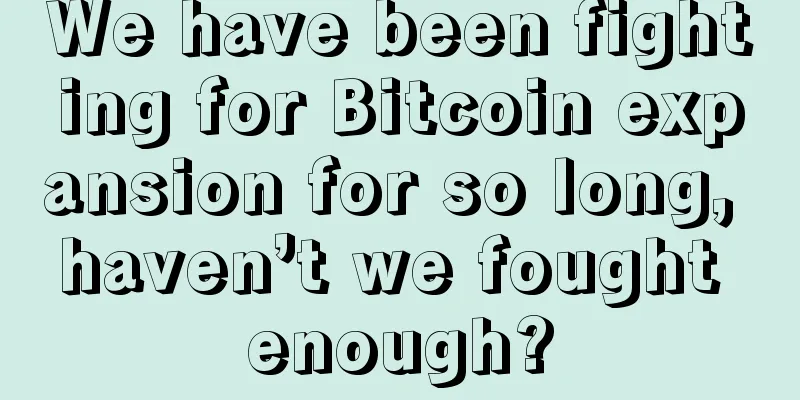We have been fighting for Bitcoin expansion for so long, haven’t we fought enough?

|
The Bitcoin block size debate is heating up. It’s been a year since we’ve heard the Bitcoin community arguing over whether to increase the current 1MB block size. So far, both sides have made some valid arguments, but few of them have been very convincing. Recently, Roger Ver, also known as ‘Bitcoin Jesus’, wrote an article about why the Bitcoin block size needs to be increased. In the article, he clarified the issue by comparing Bitcoin blocks to Starbucks coffee shops. Those who are against increasing the block size argue that all Bitcoin blocks should have their space completely filled with transaction data. However, Roger Ver explained that if all Starbucks stores had a pre-fixed limit on the supply of coffee - always in short supply when demand increased - then Starbucks would not be able to grow, and similarly, for Bitcoin, this is equivalent to the Bitcoin blockchain's ability to process transactions. Increased block sizes will likely result in increased processing power and storage requirements, all of which can be easily accommodated (given Moore’s Law and the decreasing cost of storage), while also making it convenient and economical for Bitcoin users to execute transactions. Every debate has its pros and cons, and Bitcoin is no exception. Another article raises objections to Roger Ver’s views. Some of the points raised in the article are as follows: Satoshi Nakamoto limited the block size to 1MB to prevent DDoS network attacks. Should we try to change this size? Although the elusive Satoshi Nakamoto capped the block size at 1MB, he also implicitly allowed for future increases. And when Bitcoin was created, its adoption was almost nonexistent, and despite the implicit allowance for future increases, existing users remembered that the block size was fixed. Today, the Bitcoin network has grown so large and people continue to use Bitcoin for transactions that it makes sense for Bitcoin to evolve, including increasing the block limit. Bitcoin users don’t care about transaction fees They really don’t care, or at least a part of the Bitcoin community doesn’t. Bitcoin is no longer a commodity that can only be purchased through the deep web. It is gradually being used as a regular payment mode alongside fiat currencies, for cross-border transactions, and for smart contract applications. All of these will benefit from increasing the block size. People can’t wait at the Starbucks counter for half an hour for Bitcoin transactions to be confirmed while their coffee is getting cold. Cross-border transactions using Bitcoin are much simpler in terms of cost and time compared to traditional services. If Bitcoin transaction costs have risen significantly due to increased miner fees and network latency, then why would a casual user even bother to use it for perfectly legal transactions? He should rather use traditional transaction methods, which are more efficient than the Bitcoin network when it comes to processing older transactions. Lightning Network makes Bitcoin better, regardless of block size The Lightning Network is a great concept, but only a few companies are testing it. In theory, the Lightning Network can improve the transaction processing capacity of the Bitcoin network, but it still needs to record transactions on the blockchain. Technically, the Lightning Network makes sense if the two parties will make multiple transactions, but many people only make one-time transactions, and the Lightning Network transaction channel is time-limited (24 hours), which is not very meaningful for many users unless a person is shopping all day and pays immediately before reaching the checkout counter. It is more convenient to pay all the payment bills at the checkout counter. Increasing the block size also enables blockchain-based content and records management systems to safely store all content on the blockchain, transformed into a cryptographic hash of the document. The block size debate has become a never-ending topic. There is no single solution to Bitcoin network scaling that can solve all problems. It is time for both sides to compromise and work together to improve the Bitcoin network, rather than waving sticks and hoping that the other side will accept their own solutions, which will only waste more time. |
<<: Canadian bank successfully completed the world's first cross-border payment in 20 seconds
>>: The truth behind the RX 480 shortage is this? Miners mining live video
Recommend
Is it good to have a prominent brow bone? Do people with a prominent brow bone have a good fate?
People with prominent brow bones are impulsive Fr...
What is the fate of a man who cuts off his eyebrows?
What is the fate of a man whose eyebrows are cut ...
The four most likely to make a fortune
Competition in modern society is so fierce. Altho...
Understand the mining logic of Conflux, Tsinghua University’s most powerful project. Is it worthwhile to mine with graphics cards?
Recently, the news that Ethereum 2.0 will be laun...
FileNow Free Network Disk, No Registration Required, Can Share 100G Large Files
As a professional file storage service platform u...
The best face of a person who is good at directing and acting
There is a type of people who are very interestin...
How much can Filecoin increase after it is actually launched?
Under the influence of the epidemic, all walks of...
Do women with low nose bridges have very bad luck with noble men?
In fact, when it comes to luck with noble people,...
What does a heartless person look like? Who are the most heartless?
When people make friends, they pay close attentio...
How to tell a person's temperament through palmistry
There is a saying: "A big mouth means a big ...
Is Zhang Ziyi's face good?
Is Zhang Ziyi's face good? On the evening of ...
Dave Pierce of the FutureCoin Foundation talks about the FutureCoin development plan for 2016
Bitcoin has many competitors, and NXT (Futurecoin...
Bitcoin is on a tear in Nigeria, with the price breaking through $1,600
Bitcoin trading in Nigeria has become almost craz...
What does a mole under the nose mean?
People with moles under their noses usually have ...
What is the character and destiny of a woman with a lip bead?
If a woman has lip beads, what kind of personalit...









